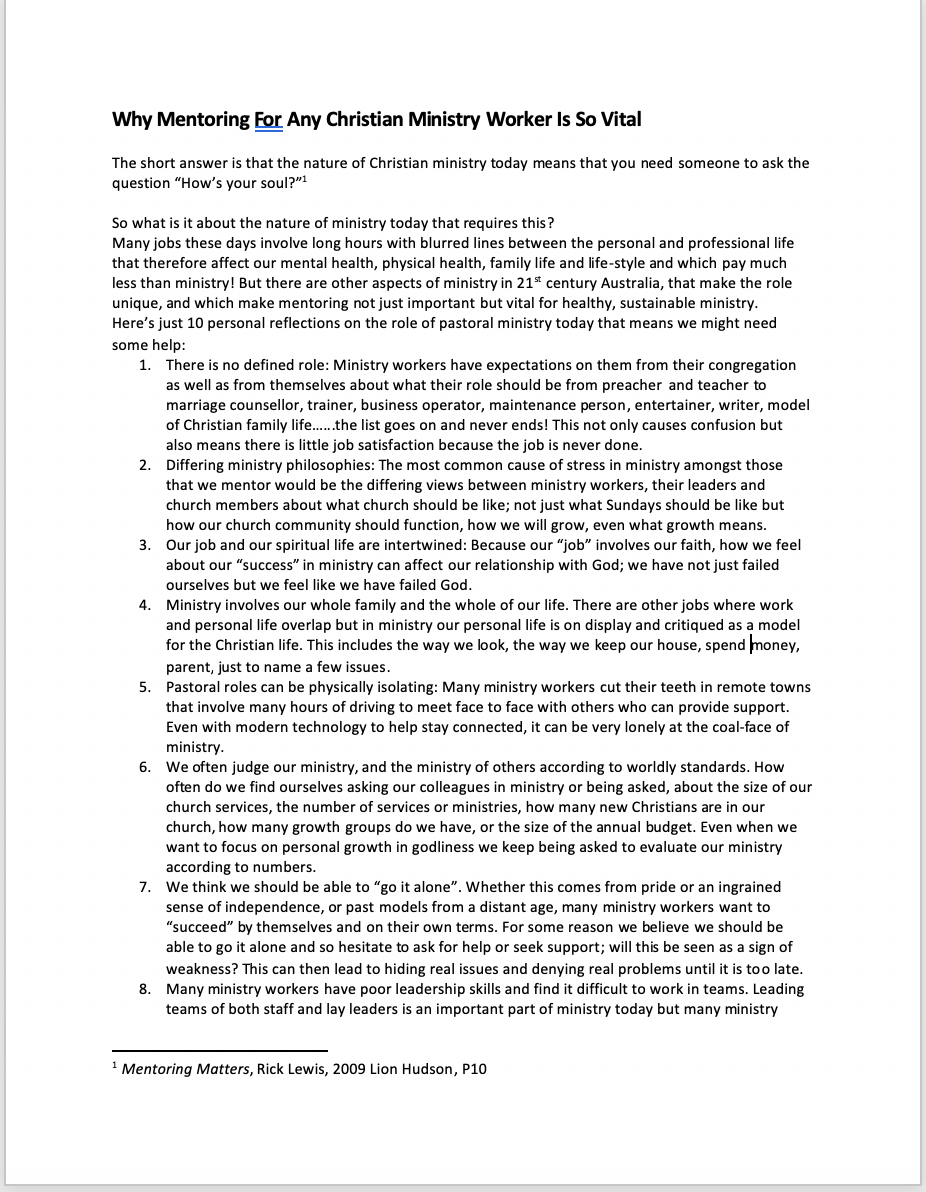The short answer is that the nature of ministry today means that you need someone to ask the question “How’s your soul?”
So what is it about the nature of ministry today that requires this?
Many jobs these days involve long hours with blurred lines between the personal and professional life that therefore affect our mental health, physical health, family life and life-style and which pay much less than ministry! But there are other aspects of ministry in 21st century Australia, that make the role unique, and which make mentoring not just important but vital for healthy, sustainable ministry.
Here’s just 10 personal reflections on the role of pastoral ministry today that means we might need some help:
-
- 1. There is no defined role: Ministry workers have expectations on them from their congregation as well as from themselves about what their role should be from Sunday preacher to marriage counsellor, trainer, business operator, maintenance man, entertainer, writer, model of Christian family life……the list goes on and never ends! This not only causes confusion but also means there is little job satisfaction because the job is never done.
-
- 2. Differing ministry philosophies: The most common cause of stress in ministry amongst those that we mentor would be the differing views between ministers, and their leaders and church members about what church should be like; not just what Sundays should be like but how our church community should function, how we will grow, even what growth means.
-
- 3. Our job and our spiritual life are intertwined: Because our “job” involves our faith, how we feel about our “success” in ministry can affect our relationship with God; we have not just failed ourselves but we feel like we have failed God.
-
- 4. Ministry involves our whole family and the whole of our life. There are other jobs where work and personal life overlap but in ministry our personal life is on display and critiqued as a model for the Christian life. This includes the way we parent, keep our house, spend money, just to name a few issues.
-
- 5. Pastoral roles can be physically isolating: Many ministry workers cut their teeth in remote towns that involve many hours of driving to meet face to face with others who can provide support. Even with modern technology to help stay connected, it can be very lonely at the coal-face of ministry.
-
- 6. We often judge our ministry, and the ministry of others according to worldly standards. How often do we find ourselves asking our colleagues in ministry or being asked, about the size of our church services, the number of services or ministries, how many new Christians are in our church, how many growth groups do we have, or the size of the annual budget. Even when we want to focus on personal growth in godliness we keep being asked to evaluate our ministry according to numbers.
-
- 7. We think we should be able to “go it alone”. Whether this comes from pride or an ingrained sense of independence, or past models from a distant age, many clergy want to “succeed” by themselves and on their own terms. For some reason they believe they should be able to go it alone and so hesitate to ask for help or seek support; will this be seen as a sign of weakness? This can then lead to hiding real issues and denying real problems until it is too late.
-
- 8. Many clergy have poor leadership skills and find it difficult to work in teams. Leading teams of both staff and lay leaders is an important part of ministry today but many ministry workers lack the personal skills required to lead teams, develop leaders, train people and manage staff.
-
- 9. We are so busy that we neglect our personal relationship with God. It’s ironic that the very reason that we go into ministry, to grow others in the knowledge and love of the Lord Jesus, is often what gets neglected in our own life and because of this, we can feel a fraud but more importantly, we fail to nourish the important source of our motivation and empowering in ministry.
- 10. We are sinful, human beings struggling with our own emotional baggage, family of origin stuff, sinful strategies, insecurities and personality flaws, that often shape our responses rather than being shaped by the child of God that we have become.
If you are feeling uncomfortable about this list, so am I, because what I want most is to be a person shaped by the gospel of the Lord Jesus Christ and whose ministry reflects His priorities and values and His personality and practices, but I am continually being sucked into evaluating myself and my ministry by the above criteria. That is why I need someone to ask me “How’s your soul?”
Christian mentoring provides an environment to answer that question. If you have a friendship that regularly challenges you to reflect on your personal spiritual walk and how that is shaping your ministry, then be thankful to God and nurture that relationship but most of us don’t have someone like that in our lives, even if we hope our spouse is doing that! A mentor provides a perspective from outside your ‘system’ and helps you to reflect on your Christian character rather than just your skills or ‘successes’. The formal, intentional relationship provides a safe environment to focus on your personal goals. Ultimately, we minister out of who we are in Christ and when we are securely rooted and grounded in Him we will be less impacted by the unhelpful expectations of others and more able to pursue God’s agenda for our lives and our ministry. We will also be able to weather the pressures of ministry and persevere for long term gains.
Rick Lewis’ definition of Christian mentoring summarises this purpose:
“Within intentional empowering, unique relationships, Christian mentoring identifies and promotes the work of God’s Spirit in others’ lives, assisting them to access God’s resources for their growth and strength in spirituality, character and ministry”
It is not surprising then that the Bible provides us with many examples of mentoring relationships: Moses and Joshua, Elijah and Elisha, Priscilla, Aquila and Apollos, Barnabas and Paul, Paul and Timothy and of course Jesus and the disciples. The Biblical precedent is reason alone to think about such a relationship for yourself. Christian mentoring differs from coaching, counselling, pastoral care, spiritual direction, discipling and friendship and uniquely provides the encouragement to reflect on what really matters about our relationship with Jesus and provides the tools to tackle the personal challenges that hold us back from living God’s agenda for our lives. If we want this for our lives, we need to be seeking out a Godly mentor for ourselves, learning how to be that mentor for others, and supporting the training of mentors for the future.
Find out more about Mentoring through Healthy Churches here.


